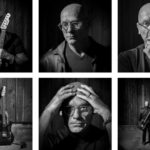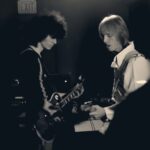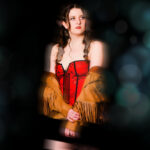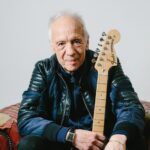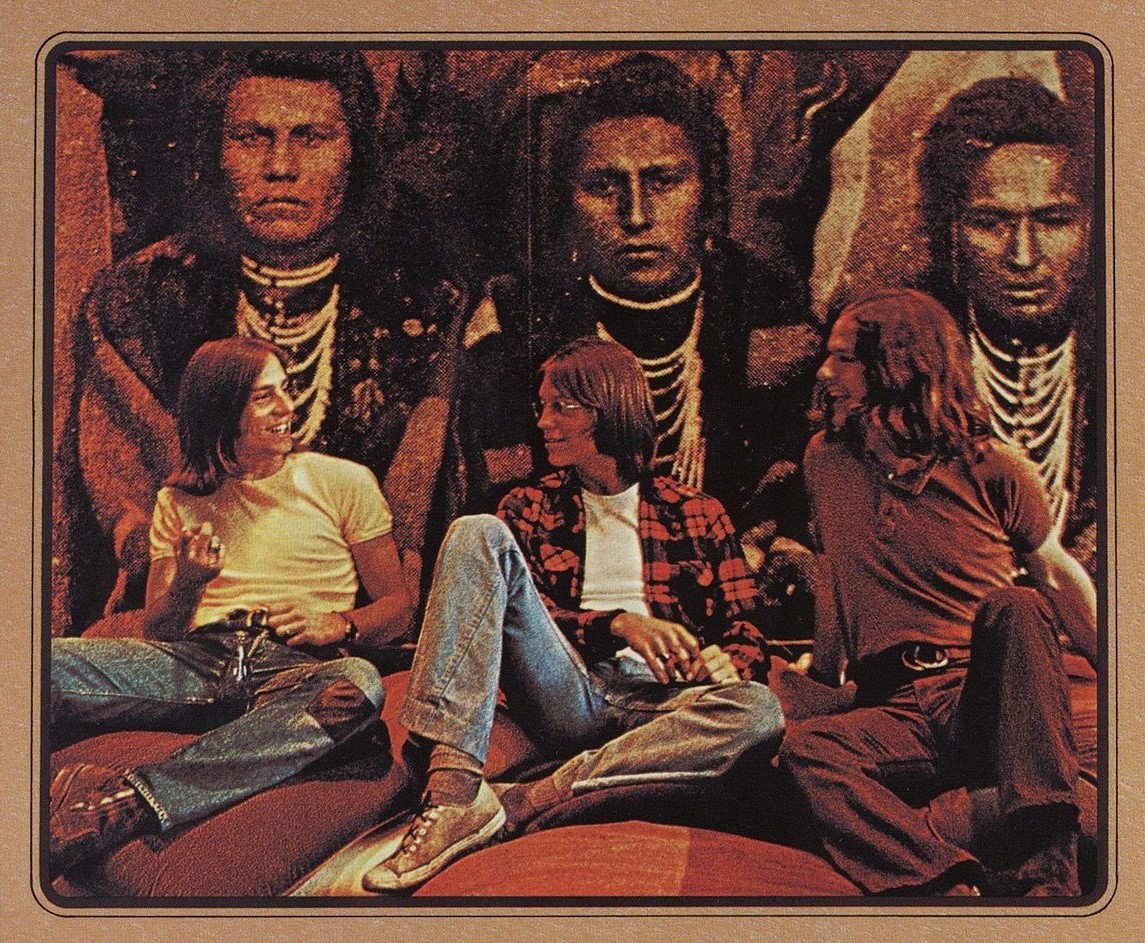
Gerry Beckley recalls the origins of America, the creative process behind ‘A Horse With No Name’, ‘I Need You’, and their meteoric rise to fame in the early 1970s. This is an extract of a full interview between Gerry and Jason Barnard also on The Strange Brew.
Take us back to the late 60s. You and Dewey were in London and your fathers were in the Air Force. Is that right?
True. Jason, we were stationed, and we went to a school called London Central. Which I say it was neither. It wasn’t in London. It wasn’t very central. It was up near Watford. My dad and Dew’s dad were at a base outside of London called Ruislip.
That’s how we met all of the kids, the dependents of the servicemen went to this school, London Central. And we met in 67, 68, our junior year of high school. Along with our third member, Dan, we played in high school bands. That was dance top 40 stuff that played at the base every weekend.
We graduated from high school in 69. By that time, I had started to do a few sessions in London. And I knew that I was going to stay there. Both Dewey and I had English mothers. I was going to at least hang out there with London, a fantastic city for music, as you well know. So I started to get to know a few people.
Dew said he had some original material, and I had started writing some stuff. Dan went away for about a half a semester of college, which didn’t go well. And he came back and he had been writing. So we started sitting around in each other’s houses. By that time, the guy with an acoustic was really blowing up, James Taylor, Crosby, Stills and Nash. So the three of us with our acoustics were singing harmony. We weren’t reinventing the wheel, but we were certainly there near the start of that. That led to the first album. Then the first album blew up. ‘Horse’ wasn’t really on the first album, it was added to it. Then it was kind of a 10 year rocket ship, we held on for all our might and survived.
You were recording at Morgan Studios out of hours because there’s some of that early material where you are singing like ‘Today’, for example. So you were honing your chops in the studio by songwriting which laid the ground for America.
Yeah. I don’t know how that stuff came out, but I know I did other sessions. But the majority of my stuff, I was doing at Morgan in Willesden. There was a guy named Chris Neil, and he was hired as an A&R guy or something, or he was going to write songs for their publishing.
So he started using me on his demos, and I would swap, I played bass on this, or keys, Wurlitzer or something. Then they’d give me some studio time. That was how I got started. Then I think what happened when Morgan finally sold, it went through quite a few different incarnations.
But I think somebody ended up with that archive of all those tapes, because when that stuff started showing up, I think the album that came out said something like Discover America or Discovering America. In the credits, it says, truly, this isn’t really America, but it’s Gerry’s earliest stuff. You’ve got to be careful when the early stuff comes out, because it’s usually a little bit cringe worthy.
There’s a lovely story because I was playing with these other guys doing sessions for singer-songwriter Phil Reed, and he was cutting stuff. When his stuff was being shopped around, the story goes that the A&R guys at Warner said, “I don’t really hear it.” Then a guitar solo that I played came on and they said, “Well, who’s that?” The guy who was shopping us said, “Actually, that’s an American kid who was on the session.” They said, “He’s got a band.” And they said, “Well, bring me his band.” So that’s how we got into Warner’s late 70, early 71.
I’ve read in Jude Warne‘s biography of America, that “I Need You” is influenced by The Bee Gees’ ‘First of May’, is that right?
Of course, one of many songs. I loved the Gibb brothers from the very earliest days. In fact, personal favourites are all of that early stuff, ‘Holiday’ and ‘Mining Disaster.’ ‘First Of May’ has the line, ‘When I was small and Christmas trees were tall, we used to laugh while others play. So I just grabbed, ‘We used to laugh’. I loved the phrasing of it and put it at the start of a tune and I was off and running.
What were Dewey’s influences for writing ‘A Horse With No Name’?
There are quite some pretty serious influences on that, including Neil Young at the top of the list. There’s a lovely quote in Neil’s book which we knew anyway, where his dad called him and said, “I love your new song about the horse. This is great.”
We came up right in that era. Thank God for John Peel. He was such a great source at that time. We were playing the Roundhouse. Jeff Dexter was booking us. We were on unbelievable bills. We played the Oval with The Faces and The Who, and I think Vince Crane and Atomic Rooster. I have great memories of that time.
I’ve read that ‘Horse’ was demoed at Arthur Brown‘s house.
The guys who were in the Crazy World, they had some kind of farm and they used it as a demo facility. I think you could hire it out and Warners knew about it. So we went down there. What happened was we’d done the album. Everybody loved the album but they weren’t really convinced. It’s the classic we don’t know if we hear a single.
So they did an amazing thing and said, “Do you have anything else?” Well, nowadays that really wouldn’t happen. They wouldn’t say, right, the album’s done. Now let’s put you back in. They’d wait two or three years and see if their investment was paying off. But in this case, thank God, they said, “Have you got anything else?” And we went in and we went to that place and we had three or four songs, which we rehearsed. We kind of liked them all, “Here’s the new batch.”
We weren’t really sure what they were going to say. It was a lesson that we learned very early on, believe it or not, sometimes it’s a good idea to listen to the label. Everybody always figures that you’re pitting yourself against the suits that don’t know anything. But in this case, they said, “Oh, it’s got to be Horse, the desert song.” So we went in but we couldn’t get into Trident where we’d done the album. So we went to Morgan. So I was back at Morgan, which is where we cut ‘Horse’.
It was a huge success, a number one single. That must have been mind blowing.
It was mind blowing. In particular, it was mind blowing for everybody around us. Not only was ‘Horse’ number one, but the album went to number one in the States. So we had the simultaneous number one album and single, not even The Beatles had done that.
I’ll tell you how rare that is. That didn’t happen again until The Knack with ‘My Sharona.’ So the honest story is that the three of us were thinking that you put out a record, you really love it, it’s going up the charts and yeah, great. But the people around us, the label, couldn’t believe it. Warners, as much as they were a representative of the mega American motherload, by no means did everything that they signed get even released in the States, let alone show up in the charts.
So for Warners UK, Ian Ralfini and Martin Wyatt and all these guys, all of a sudden have a number one record in the States. It was really something. That starts that whole thing, it’s very hard to follow that, that’s what we call the sophomore jinx in the States, your second one. We cleared all those hurdles. We did very well. The second album actually sold more than the first. And so it was a pretty amazing time.
The pull of going to the USA must have been strong. You did go and base yourself back over in the States.
We went over to do a tour in order to get that album and single released. Because as I was saying, not everything that Warners signs in the UK gets even put out. And because it was a big hit in England, Mo Ostin and Joe Smith said, “Sure, we’ll put it out. If they’ll come over and do a club tour.”
We said “Of course we’ll come over. We’re just playing every pub in England anyway.” So we were flown over and we were booked to open for the Everlys for the first few weeks. The first shows in the States were in DC at a famous little club called the Cellar Door. There was a line around the block to see us, which was lovely, but we were only booked for like 20 or 30 minutes.
The Everlys were fantastic. They were touring with Pop Everly, their dad. The band, I’ll never forget, had Warren Zevon on keyboards and Waddy Wachtel was on guitar. It was 1972. So it was fantastic, but everybody there had no interest in seeing the Everlys.
So they’d listen to a couple of tunes and leave because they’d come to see us see these kids from England. So the next week we were supposed to do the same thing in a little club outside of Boston and the Everlys got sick, supposedly, basically cancelled. The guy said, “It’s okay, man, the phone’s ringing off the hook.” We only had like 30, 40 minutes, we’d only been opening for everybody. He said,”It’s okay, I’ve hired a comic, this kid named Jay Leno is going to do like three weeks.”
So we had Jay Leno opening for us. Then it just blew up. By the time we hit the Whiskey, which was the last week in the middle of March, it wasn’t quite number one, but it was clear it was going to be. We were booked for a week, sold out, lines around the block. It was really lovely. It was just hyper speed. Brian Wilson was coming on multiple nights and it was pretty amazing.
The songs in that period are timeless. ‘Ventura Highway’ being an example. Was that about travelling in the States?
Yeah, Dewey wrote Ventura and had lived in California. I had never even been to California until we played the Whiskey. But I know the imagery. In fact, Dewey was in his mind just trying to dredge it all up. They lived at Vandenberg Air Force Base, which is on the California coast. So there really isn’t a Ventura Highway. There’s the Ventura Freeway, there’s Ventura Boulevard, there’s a town of Ventura.
But he was just bringing back all these memories. But he’s writing the song in our little rain-soaked cottage up in Chipperfield in Hertfordshire. So that and Horse were coming out of Dewey’s head. But boy, did it fit the moment, because it’s kind of top-down music, and it’s classic to this day.
How did the songwriting work? Did you write your songs individually? Or was it a bit like Lennon-McCartney who would bounce the odd idea against each other?
There was a bit of that. We didn’t ever, at the time, co -credit. And I would certainly don’t want to take any credit on Dewey’s tracks. But we did help each other out a little bit. Like, I was pretty good if a song needed a bridge, I could come up with a few chords, just a left turn if the thing needed a little bit of air. And likewise for Dewey, if he heard a little counter melody line, he would say, “What about this line?” So we did.
But they were usually just credited to whoever sang it. Like, “I Need You”, I sang. That was mine. ‘Horse’ and ‘Ventura’ were Dewey’s. Dan had a big hit with ‘Lonely People’. That’s him singing that. Years later, that’s blown up. If you look at the hits today, they’ll be 10 or 15 writers. I prefer the old style myself.
Further information
Gerry Beckley’s single ‘Crazy’ is out now. It is from his forthcoming self-titled album.
The audio of this interview will come out in a Strange Brew Podcast in June.
